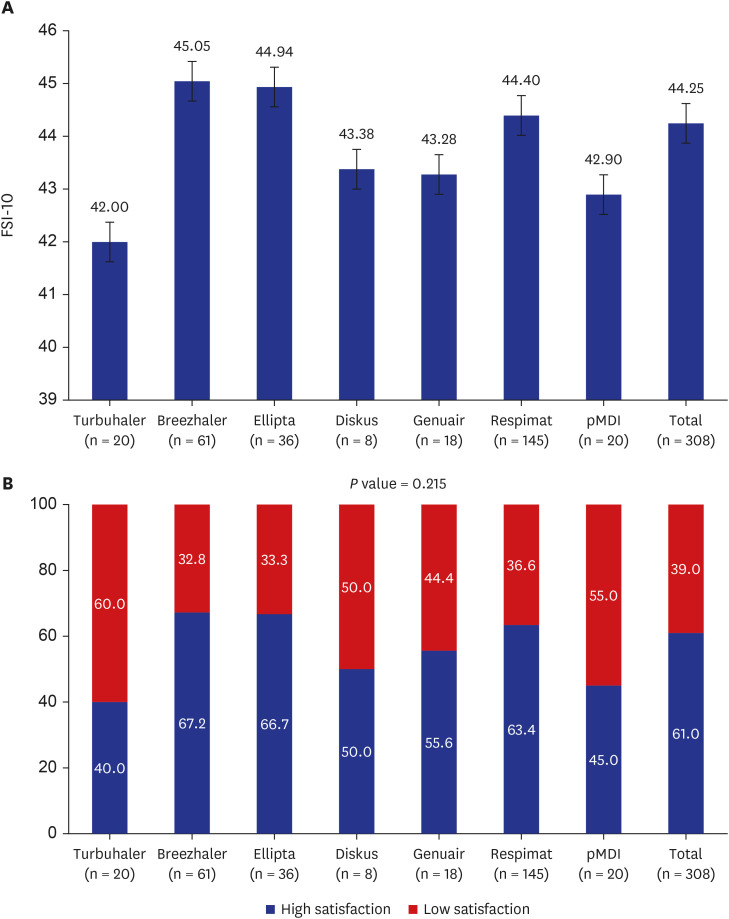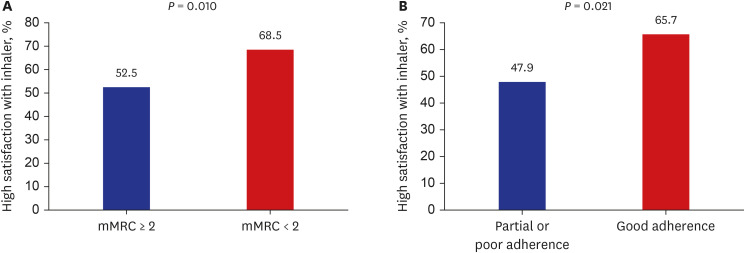J Korean Med Sci.
2022 Nov;37(46):e327. 10.3346/jkms.2022.37.e327.
Assessment of Inhaler Satisfaction and Determinants of High Satisfaction Among Korean COPD Patients
- Affiliations
-
- 1Division of Pulmonology and Allergy, Department of Internal Medicine, Yeungnam University Medical Center, College of Medicine, Yeungnam University, Daegu, Korea
- KMID: 2536134
- DOI: http://doi.org/10.3346/jkms.2022.37.e327
Abstract
- Background
The Global Initiative for Chronic Obstructive Lung Disease (GOLD) guidelines for chronic obstructive pulmonary disease (COPD) recommend considering patient preference when choosing an inhaler device. However, few studies have assessed both inhaler satisfaction and factors associated with high inhaler satisfaction. Therefore, we assessed inhaler satisfaction and determinants of high satisfaction in Korean COPD patients.
Methods
COPD patients were prospectively enrolled from January 2018 to November 2019. The 308 inhalers used by the 261 participants in this study included dry powder inhalers (Turbuhaler, Breezhaler, Ellipta, Diskus, and Genuair), a soft mist inhaler (Respimat), and pressurized metered dose inhalers (pMDIs). Inhaler satisfaction was assessed by the Feeling of Satisfaction with Inhaler (FSI-10) questionnaire. High inhaler satisfaction was defined as an FSI-10 ≥ 43.
Results
Among 261 COPD patients, 163 (62.5%) were highly satisfied with their inhaler device. The rates of high inhaler satisfaction for Turbuhaler, Breezhaler, Ellipta, Diskus, Genuair, Respimat, and pMDI usage were 40.0%, 67.2%, 66.7%, 50.0%, 55.6%, 63.4%, and 45.0%, respectively (P = 0.215). In univariate analyses, higher body mass index, non-current smoker, GOLD grades I and II, a modified Medical Research Council (mMRC) score < 2, lower inhaler puff burden, once daily usage of inhaler, and good inhaler adherence were associated with high inhaler satisfaction. In multivariate analyses, an mMRC score < 2, and good inhaler adherence were independently associated with high inhaler satisfaction.
Conclusion
High inhaler satisfaction was associated with dyspnea symptom and good inhaler adherence in COPD patients. Effective strategies are needed including appropriate inhaler device selection, consideration of patient preference, and repeated inhaler education to improve patient satisfaction of inhalers.
Figure
Reference
-
1. Ahn JH, Chung JH, Shin KC, Choi EY, Jin HJ, Lee MS, et al. Critical inhaler handling error is an independent risk factor for frequent exacerbations of chronic obstructive pulmonary disease: interim results of a single center prospective study. Int J Chron Obstruct Pulmon Dis. 2019; 14:2767–2775. PMID: 31819409.2. Lee HY, Song JH, Won HK, Park Y, Chung KB, Lim HJ, et al. Comparing inhaler use technique based on inhaler type in elderly patients with respiratory disease. Tuberc Respir Dis. 2021; 84(1):46–54.3. Jang JG, Chung JH, Shin KC, Jin HJ, Lee KH, Ahn JH. Comparative study of inhaler device handling technique and risk factors for critical inhaler errors in Korean COPD patients. Int J Chron Obstruct Pulmon Dis. 2021; 16:1051–1059. PMID: 33907392.4. Plaza V, Giner J, Curto E, Alonso-Ortiz MB, Orue MI, Vega JM, et al. Determinants and differences in satisfaction with the inhaler among patients with asthma or COPD. J Allergy Clin Immunol Pract. 2020; 8(2):645–653. PMID: 31586668.5. Singh D, Agusti A, Anzueto A, Barnes PJ, Bourbeau J, Celli BR, et al. Global strategy for the diagnosis, management, and prevention of chronic obstructive lung disease: the GOLD science committee report 2019. Eur Respir J. 2019; 53(5):1900164. PMID: 30846476.6. Small M, Anderson P, Vickers A, Kay S, Fermer S. Importance of inhaler-device satisfaction in asthma treatment: real-world observations of physician-observed compliance and clinical/patient-reported outcomes. Adv Ther. 2011; 28(3):202–212. PMID: 21331556.7. Plaza V, Giner J, Calle M, Rytilä P, Campo C, Ribó P, et al. Impact of patient satisfaction with his or her inhaler on adherence and asthma control. Allergy Asthma Proc. 2018; 39(6):437–444. PMID: 30336791.8. Price D, Harrow B, Small M, Pike J, Higgins V. Establishing the relationship of inhaler satisfaction, treatment adherence, and patient outcomes: a prospective, real-world, cross-sectional survey of US adult asthma patients and physicians. World Allergy Organ J. 2015; 8(1):26. PMID: 26417397.9. Zervas E, Samitas K, Gaga M. Assessment of satisfaction with different dry powder inhalation devices in Greek patients with COPD and asthma: the ANASA study. Int J Chron Obstruct Pulmon Dis. 2016; 11:1845–1855. PMID: 27540287.10. Chrystyn H, Small M, Milligan G, Higgins V, Gil EG, Estruch J. Impact of patients’ satisfaction with their inhalers on treatment compliance and health status in COPD. Respir Med. 2014; 108(2):358–365. PMID: 24209768.11. Perpiñá Tordera M, Viejo JL, Sanchis J, Badia X, Cobos N, Picado C, et al. Assessment of patient satisfaction and preferences with inhalers in asthma with the FSI-10 questionnaire. Arch Bronconeumol. 2008; 44(7):346–352. PMID: 18727886.12. Valero A, Ribó P, Maíz L, Barbero E, Calle M, Campo C, et al. Asthma patient satisfaction with different dry powder inhalers. Expert Rev Respir Med. 2019; 13(2):133–138. PMID: 30625015.13. Baddar S, Jayakrishnan B, Al-Rawas OA. Asthma control: importance of compliance and inhaler technique assessments. J Asthma. 2014; 51(4):429–434. PMID: 24304046.14. Faul F, Erdfelder E, Buchner A, Lang AG. Statistical power analyses using G*Power 3.1: tests for correlation and regression analyses. Behav Res Methods. 2009; 41(4):1149–1160. PMID: 19897823.15. Ahn JH, Chung JH, Shin KC, Jin HJ, Jang JG, Lee MS, et al. The effects of repeated inhaler device handling education in COPD patients: a prospective cohort study. Sci Rep. 2020; 10(1):19676. PMID: 33184428.16. Man KN, Tian Z, Lam DC, Wan JM, Tan-Un KC. Satisfaction, preference and error occurrence of three dry powder inhalers as assessed by a cohort naïve to inhaler operation. Int J Chron Obstruct Pulmon Dis. 2018; 13:1949–1963. PMID: 29942127.17. Daniels T, Goodacre L, Sutton C, Pollard K, Conway S, Peckham D. Accurate assessment of adherence: self-report and clinician report vs electronic monitoring of nebulizers. Chest. 2011; 140(2):425–432. PMID: 21330381.
- Full Text Links
- Actions
-
Cited
- CITED
-
- Close
- Share
- Similar articles
-
- Recent advance in inhaler medications for chronic obstructive pulmonary disease patients
- Patient Satisfaction after Total Knee Arthroplasty
- Effects of Educational Interventions for Chronic Airway Disease on Primary Care
- Predictors of Nurse Turnover: Model Development and Testing
- The Determinants of Job Satisfaction of Nurses: Focused on Work Rewards




